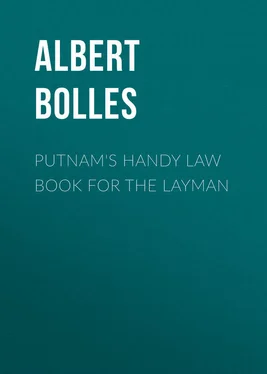Albert Bolles - Putnam's Handy Law Book for the Layman
Здесь есть возможность читать онлайн «Albert Bolles - Putnam's Handy Law Book for the Layman» — ознакомительный отрывок электронной книги совершенно бесплатно, а после прочтения отрывка купить полную версию. В некоторых случаях можно слушать аудио, скачать через торрент в формате fb2 и присутствует краткое содержание. Издательство: Иностранный паблик, Жанр: foreign_antique, foreign_prose, на английском языке. Описание произведения, (предисловие) а так же отзывы посетителей доступны на портале библиотеки ЛибКат.
- Название:Putnam's Handy Law Book for the Layman
- Автор:
- Издательство:Иностранный паблик
- Жанр:
- Год:неизвестен
- ISBN:нет данных
- Рейтинг книги:5 / 5. Голосов: 1
-
Избранное:Добавить в избранное
- Отзывы:
-
Ваша оценка:
- 100
- 1
- 2
- 3
- 4
- 5
Putnam's Handy Law Book for the Layman: краткое содержание, описание и аннотация
Предлагаем к чтению аннотацию, описание, краткое содержание или предисловие (зависит от того, что написал сам автор книги «Putnam's Handy Law Book for the Layman»). Если вы не нашли необходимую информацию о книге — напишите в комментариях, мы постараемся отыскать её.
Putnam's Handy Law Book for the Layman — читать онлайн ознакомительный отрывок
Ниже представлен текст книги, разбитый по страницам. Система сохранения места последней прочитанной страницы, позволяет с удобством читать онлайн бесплатно книгу «Putnam's Handy Law Book for the Layman», без необходимости каждый раз заново искать на чём Вы остановились. Поставьте закладку, и сможете в любой момент перейти на страницу, на которой закончили чтение.
Интервал:
Закладка:
The federal government also has three courts corresponding somewhat to the courts established by the states. First is a court existing in every state called the district court, while some states, like New York, are divided into several districts. An appeal lies from its decision to the court of appeals consisting of three judges. There are nine of these courts, one for each circuit into which the United States is divided. Lastly appeals may be taken from their decisions and also from the decisions of the supreme courts of the states to the supreme court of the United States consisting of nine judges. An appeal does not lie in every case decided by a state court or by the federal courts of appeal; only such cases as the highest court shall decide after application, made in proper form, may be appealed and heard by that tribunal.
We have already explained the term equity. Formerly there were courts to try and decide equity cases. England still maintains such courts and a few exist in the United States; New Jersey and Delaware are two of these states. The chief official of the court is called a chancellor, the others vice chancellors. Instead of an action, as in a court of law, the preliminary proceeding is called a petition or bill, and while in substance it is similar to an action or complaint, used in a court of law, the form is quite different. The modern tendency of the law, considered in the most general way, is to fuse law and equity, and to endow law judges with equity powers. For further explanation see Legal Remedies and Equitable Remedies .
Adopted Child.– Children are sometimes adopted. By doing so the natural parents lose all personal rights and are relieved from all legal duties. The adopted parents acquire the right to the adopted child's custody and control, to his services and earnings, and they must maintain and educate him. In some states he becomes the heir of the adopted parent like a natural child, with some limitations. Who can inherit an adopted child's property is not clearly settled. He can also inherit from his natural parent and kindred as if he had not been adopted. In Massachusetts the courts hold that an adopted child will take like a natural child under a residuary clause in an adopted father's will giving all the property not otherwise devised to his child or children. See Parent and Child .
Agency.– Much of the business of our day is done by agents or persons who represent others. The most general division is into general and special agents. A general agent is one who has authority to act for his principal or person he represents in all matters, quite as the principal himself could do; or in some of his matters. Thus if a principal had a farm he might have a general agent to act as his farmer; if he owned a mill, another general agent who had charge of it. If he had two mills, he might have a general agent for each, and so on.
A special agent is authorized to do a specific thing, to sell a home, buy a horse, or effect some particular end or purpose. While this distinction is plain enough in many cases, in others the lines run so close together that it is difficult to decide whether one is a general or special agent.
Whenever one acts as a general agent he is supposed to have all the authority that general agents possess who thus act for their principals, unless the person who is dealing with him knows of the restriction on his authority. Suppose one goes to the office of a general insurance agent to get insurance on his home. A policy is taken and afterwards the house burns up. The company declines to pay because the agent made a lower rate than was authorized by his company. The insured however knew nothing about the restriction, and supposed that the agent had the same authority as other insurance agents have concerning rates. The company would be obliged to pay. But if the insured knew that restrictions had been put on the agent and that he was violating them in giving him the lower rate, the company would not be liable.
One who deals with a special agent must find out what authority he possesses; therefore more care is needful in dealing with a special than with a general agent. His authority must be strictly pursued. Thus it is said that a person dealing with him "acts at his own peril," is "put upon inquiry," "is chargeable with notice of the extent of his authority," "it is his duty to ascertain," "he is bound to inquire," "and if he does not he must suffer the consequences."
In some cases the law creates an agency. Thus an unpaid vendor of goods sometimes has authority to sell them, so has a pledgee of goods outside the authority conferred by the contract pledging them. A married woman whose husband does not supply her has a limited power to buy necessaries on her husband's credit, which prevails notwithstanding any objection he may make. A minor sometimes has the same power.
A person can act as an agent for another who cannot act for himself. Minors therefore can thus act. Besides individuals, corporations often act for others.
The authority of an agent may be given in writing, a power of attorney so called, or he may act, and often does, without written authority, especially a general agent. To this rule there is one well understood exception. If an agent is required in executing his authority to sign a deed or other writing, especially a sealed writing, his authority must also be equally great. In executing a deed therefore his authority must be in writing under seal, and when the deed is recorded, the agent's written authority should also be recorded; this is the usual practice. If this is not done, some person who afterward wished to purchase the land might object because the recorded title was defective.
A particular usage or custom also affects an agent's powers. If the principal confers on him authority to transact business of a well-defined nature, bounded by well-defined usage and customs, the law presumes the agency was created with reference to them. This protection affects agents and third persons alike, the latter therefore who act in good faith in such dealings are protected against secret limitations of which they had no notice.
An agent has no authority to purchase his principal's property. To do this, in a sense, would be to purchase of himself. The temptation to do this is sometimes very great, too great for him to withstand, and so he resorts to a crooked method for accomplishing his end. He sells the property to another party who afterward sells it back to him. The worst violators of this principle have been railway receivers, who have taken advantage of their position to get control of the property entrusted to them at a sum much less than its real value. Such sales can be set aside by proper legal procedure. By the modern rule they are not void but are voidable, that is, can be set aside if the creditors or other interested parties wish to do so.
Whenever therefore one deals with a general agent and his authority is disputed, unless there be restrictions known to the person dealing with him, the liability of his principal turns on the answer to the general question, what authority do general agents like himself have. This is simply a question of fact, to be determined like every other question of fact by the court in which the controversy is pending.
Another way of rendering a principal liable for the act of his agent is by ratifying it. Suppose A professed to be the agent of B in building a house for C, and built it so badly that C sued B to recover damages, whose defense was, that A was not his agent. Suppose, however, that B accepted payment for the house, this would be a ratification of A's authority to act for B even if he did not have proper authority in the beginning. Suppose A had authority to sell goods for B but not to collect payment, and someone should pay him and he ran off with the money, could his principal still collect the money of the buyer of the goods? This is a hard case, and has happened many times. The buyer usually is required to pay the second time. But if B, notwithstanding his direction to his agent not to collect payment, should receive it such conduct would operate as a ratification.
Читать дальшеИнтервал:
Закладка:
Похожие книги на «Putnam's Handy Law Book for the Layman»
Представляем Вашему вниманию похожие книги на «Putnam's Handy Law Book for the Layman» списком для выбора. Мы отобрали схожую по названию и смыслу литературу в надежде предоставить читателям больше вариантов отыскать новые, интересные, ещё непрочитанные произведения.
Обсуждение, отзывы о книге «Putnam's Handy Law Book for the Layman» и просто собственные мнения читателей. Оставьте ваши комментарии, напишите, что Вы думаете о произведении, его смысле или главных героях. Укажите что конкретно понравилось, а что нет, и почему Вы так считаете.












